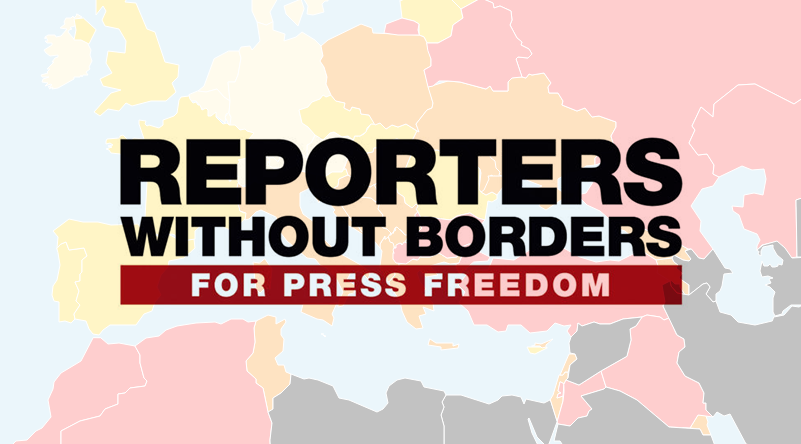
PARIS, 26.04.2017. – The 2017 World Press Freedom Index compiled by Reporters Without Borders (RSF) reflects a world in which attacks on the media have become commonplace and strongmen are on the rise. We have reached the age of post-truth, propaganda, and suppression of freedoms – especially in democracies.
The organization has published report every year since 2002 measures the level of freedom of information in 180 countries. It reflects the degree of freedom that journalists, news organizations, and netizens enjoy in each country, and the efforts made by the authorities to respect and ensure respect for this freedom.
Their 2017 report was published noting different trends in the Western Balkan region – while Serbia and Croatia were downgraded compared to 2016, good developments were recorded in Kosovo, Macedonia, Bosnia and Herzegovina. Montenegro’s position remains the same.
Serbia – European standards still out of reach
Rank: 66 of 180 countries (-7 compared to 2016)
World Press Freedom Index 2017 downgraded Serbia’s ranking from 59 to 66 compared to 2016. The report states that media freedom has declined ever since Aleksandar Vucic, Slobodan Milosevic’s former information minister, became Prime Minister in May 2014.
The media work under harsh financial and editorial pressure, and those that are most critical of the government are attacked publicly. The investigative media groups BIRN and CINS, the daily Danas, and the weekly Vreme are often targeted. “Hostile” media are subjected to frequent arbitrary financial and administrative inspections. Three laws complying with European “standards” on freedom of information were approved with the aim of facilitating admission to the EU but were never put into effect.
Croatia – Government interference in public broadcasting
Rank: 74 of 180 countries (-11 compared to 2016)
Journalists investigating corruption, organized crime, or war crimes are often subjected to harassment campaigns. Defamation is criminalized and insulting “the Republic, its emblem, its national hymn or flag” is punishable by up to three years in prison. Worse still, “humiliating” media content has been criminalized since 2013.
Government interference in the Croatian public broadcasting company HRT challenges media freedom and media independence in the country. Croatia’s Parliament fired HRT’s director-general in March 2016 and appointed an acting director who proceeded to demote or reassign approximately 70 journalists and editors as part of what critics have called an ideologically driven “purge.”
Bosnia-Herzegovina – Highly protected media but…
Rank: 65 of 180 countries (+3 compared to 2016)
This country has the world’s most liberal media freedom laws but their implementation is held back by a saturated judicial system. Defamation was decriminalized in 2003 but lawsuits are still possible. Journalists are often the targets of threats and political pressure. The situation is aggravated by the fact that the pro-government media continue to enjoy direct and indirect state subsidies.
Macedonia – Balkans’ bad boy
Rank: 111 of 180 countries (+7 compared to 2016)
Media freedom has declined throughout the region, but the erosion of the rule of law has been most visible in Macedonia, a candidate for EU membership. Defamation was removed from the criminal code in 2012, but prosecutions have been replaced by civil actions with the possibility of heavy fines and jail terms for reporters and media owners.
There were many reports of threats, violence, harassment, and intimidation of journalists during political demonstrations in 2016, but of those responsible, few were charged. Political instability affects the work of journalists, and pressure from the ruling party has led some media outlets to censor themselves.
Kosovo – Balkan archetype 82
Rank: 82 of 180 countries (+8 compared to 2016)
News providers in Kosovo suffer from direct and indirect political interference, financial pressures, and concentrated ownership. Journalists who criticize the Kosovar authorities are often accused of being “traitors” or “Serbian sympathizers.” Media that do not toe the government line may be subjected to intimidation in the form of financial or tax inspections.
Access to information pertaining to institutional activities remains limited, restricting the reporting abilities of journalists in the country. The ethnic division in the country is mostly evident in the media, with stilted cooperation and goodwill existing between Kosovo Albanian and Kosovo Serbian journalists.
Montenegro – Indirect censorship weigh on journalists
Rank: 106 of 180 countries ( same as 2016)
Journalists must censor themselves because they are often the targets of violent verbal and physical attacks, and the perpetrators enjoy systematic impunity. In October 2016, on the day of parliamentary elections, several messaging applications such as WhatsApp and Viber were blocked. The media are subject to political and economic pressure and reporters investigating government corruption are often accused of trying to harm the community.
Investigative reporter Jovo Martinovic was arrested over marijuana trafficking charges and spent nearly 15 months in custody. While he has been freed on bail, his trial is still underway. He denies the charges, emphasizing that the sole reason for contact with the traffickers was for the television documentary that he was producing. His harsh and unwarranted punishment clearly stems from his work as an investigative journalist. Defamation has been decriminalized since 2011 but lawsuits against independent journalists and media are very common.